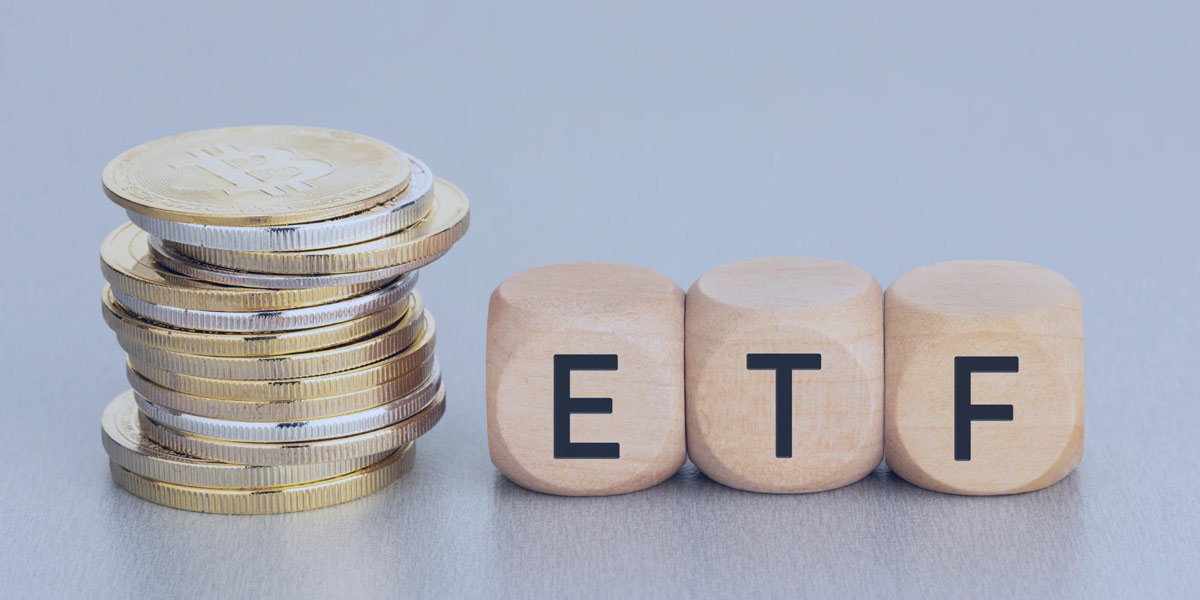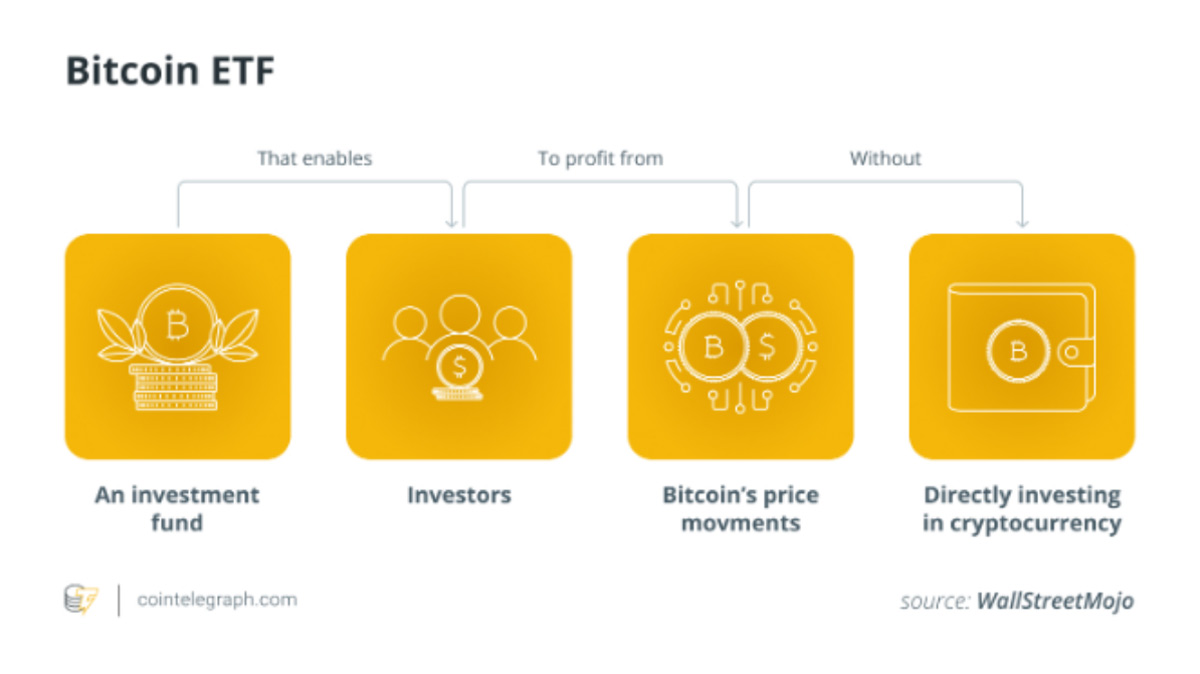Navigating the crypto world can be daunting, especially when you’re new to concepts such as crypto wallets and private keys. It’s no wonder that the idea of a Bitcoin ETF has caught the attention of many. Financial giants like BlackRock, Fidelity, and others have been knocking on the U.S. Securities and Exchange Commission (SEC) doors to get their ETFs approved. As of October 2023, we’re still waiting for the green light on a spot Bitcoin ETF from the SEC – especially the Blackrock Bitcoin ETF.
So, what does this pending approval mean for the market and, crucially, for investors? Whether you’re curious about Bitcoin ETFs or the specific BlackRock Bitcoin ETF, we’ve got you covered. From understanding the basics of ETFs to exploring the impact on Bitcoin prices, this guide aims to provide valuable insights.
What is an ETF, and How Does Bitcoin ETFs Work?

For those considering diversifying an investment portfolio but finding the idea of managing multiple stocks, bonds, or commodities overwhelming, ETFs could be a game-changer. ETF stands for Exchange-Traded Fund, essentially a curated collection of various assets available for trading on traditional stock exchanges. It’s like a playlist of financial assets, blending the best features of mutual funds, stocks, and bonds.
ETFs are traded throughout the day, similar to individual stocks, with prices fluctuating based on market supply and demand. They offer a flexible avenue for gaining exposure to a range of assets without the complexity of managing each one individually.
How Do Bitcoin ETFs Work?

Now, onto Bitcoin ETFs, a unique category within the ETF landscape. Unlike traditional ETFs that might track indices like the S&P 500 or commodities such as gold, Bitcoin ETFs are pegged to the value of Bitcoin. They offer an avenue for investment in Bitcoin without the complexities associated with cryptocurrency exchanges or cryptographic keys.
For instance, the ProShares Bitcoin Strategy ETF, trading on the New York Stock Exchange, provides a way to invest in the future performance of Bitcoin. Most Bitcoin ETFs utilize futures to emulate Bitcoin’s price movements, offering a hedge against market volatility.
The new trading opportunities they present, such as short-selling, which allows for betting against Bitcoin’s value, set Bitcoin ETFs apart. However, it’s worth noting that Bitcoin ETFs come with their own fees for aspects like custody and management of the underlying Bitcoin assets.
So, in summary, a Bitcoin ETF enables trading of Bitcoin much like any other stock, but with unique characteristics that make it an intriguing option for both seasoned and new investors.
A Timeline of Bitcoin ETFs
After understanding Bitcoin ETFs and how they work, it’s fascinating to look back at the journey these financial instruments have taken. From initial rejections by the Securities and Exchange Commission (SEC) to groundbreaking approvals, the timeline of Bitcoin ETFs is a rollercoaster that reflects the larger trends in the cryptocurrency industry and financial markets.
Timeline:
- July 2013: The first-ever Bitcoin ETF proposal is filed by the Winklevoss Bitcoin Trust.
- June 2018: The Winklevoss’ second attempt at a Bitcoin ETF gets a thumbs-down from the SEC.
- October 2019: Bitwise’s proposal for a Bitcoin ETF also faces rejection from the SEC.
- February 2020: Wilshire Phoenix joins the list of projects that couldn’t get past the SEC’s stringent requirements.
- September 2020: A milestone is reached as the world’s first Bitcoin ETF makes its debut on the Bermuda Stock Exchange.
- December 2020: VanEck takes another shot at a Bitcoin ETF, filing a new proposal after withdrawing previous ones to avoid formal rejections.
- February 2021: Canada enters the scene with the launch of its first Bitcoin ETF, the Purpose Bitcoin ETF (BTCC), followed by two more approvals: the Evolve Bitcoin ETF (EBIT) and the CI Galaxy Bitcoin ETF (BTCX).
- October 2021: The ProShares Bitcoin Strategy ETF (BITO) becomes the first U.S.-listed Bitcoin ETF.
- June 2023: BlackRock, a major financial institution, files for SEC approval of a Blackrock Bitcoin ETF, with a decision pending.
- August 2023: Europe joins the Bitcoin ETF landscape as London-based Jacobi Asset Management rolls out its offering.
- August 2023: Grayscale secures a win against the SEC, converting its Bitcoin Trust into an ETF.
Why Bitcoin ETFs? What Makes it Special?
Bitcoin ETFs are seen as a transformative force in the cryptocurrency industry, adding a layer of credibility to Bitcoin trading. Remember the buzz when corporate giants like Square and Tesla started adding Bitcoin to their balance sheets? That was a moment, but for many traditional market participants, Bitcoin still feels like the Wild West – thrilling but filled with uncertainties.
Here’s where Bitcoin ETFs come in, acting as a bridge between the crypto space and Wall Street. With approval from regulatory bodies like the Securities and Exchange Commission (SEC), these ETFs would allow market participants to engage with Bitcoin’s price dynamics without diving into the complexities of cryptocurrency exchanges. Think of it as having the ability to interact with Bitcoin in the same marketplace where Tesla stocks or gold futures are traded.
And let’s not overlook the potential ripple effect on Bitcoin prices. While there are no guarantees, the introduction of Bitcoin ETFs could be a catalyst for a positive shift in Bitcoin’s market standing.
So, in essence, Bitcoin ETFs are not just another financial product; they’re a pivotal move toward integrating Bitcoin into the mainstream financial tapestry, offering a new way to gain exposure to the largest cryptocurrency.
Bitcoin Futures ETFs vs. Bitcoin Spot ETFs
Bitcoin Futures ETFs are all about contracts. When engaging with these ETFs, investors essentially deal with a promise to buy or sell Bitcoin at a future date. They don’t actually own the Bitcoin; they own a contract. This setup offers a buffer against market volatility and price fluctuations, making it a safety net in an unpredictable market.
However, there’s a catch. Futures don’t grant the perks of actual ownership, like staking or participating in governance votes. Plus, they’ve been criticized for sometimes underperforming compared to spot prices. Why? Because these futures often trade at a price that doesn’t quite align with the actual value of Bitcoin.
Now, let’s talk about Bitcoin Spot ETFs. These are your straightforward, no-nonsense digital asset purchases. When someone buys into a Spot ETF, they get direct ownership of Bitcoin. It’s akin to buying Bitcoin from a cryptocurrency exchange without hassle. The price of the Spot ETF moves in tandem with the actual Bitcoin, eliminating the risk of price deviation that you might see in futures.
So, in a nutshell, Bitcoin Futures ETFs are backed by derivatives – specifically, Bitcoin futures contracts. On the flip side, Bitcoin Spot ETFs are backed by the real deal, actual Bitcoin. The futures come with a layer of complexity and potential price misalignment, while the spots offer a more direct and, arguably, transparent experience.
How Do Bitcoin Spot ETFs Work?
Let’s shift gears and explore the mechanics of Bitcoin Spot ETFs, a recent topic that’s been making waves. While the U.S. hasn’t yet given the green light to any spot Bitcoin ETFs, other countries are making strides. For instance, Australia is gearing up to launch the Fidelity Advantage Bitcoin ETF (FBTC), designed to invest in physical spot BTC. Meanwhile, Canada has already rolled out spot BTC ETFs, with major funds like Purpose Bitcoin, 3iQ Coinshares, and CI Galaxy Bitcoin leading the charge.
In Europe, the 21Shares Bitcoin exchange-traded products, fully exposed to spot BTC, have made their mark on various German exchanges and the Swiss Exchange. They manage assets worth approximately half a billion dollars, further solidifying the global interest in spot-based Bitcoin ETFs.
So, what’s the big deal about Bitcoin Spot ETFs? Well, as we mentioned earlier, these ETFs aim to track the actual, tangible price of Bitcoin. They offer a gateway to Bitcoin through a regulated and familiar financial product, eliminating the need for investors to hold the cryptocurrency themselves.
One unique feature of spot-based ETFs is the inability to bet on falling prices, commonly known as shorting. However, the existence of an ETF changes the game. Investors can short the ETF’s shares to capitalize on downward price movements, adding another layer of strategy to Bitcoin investing.
Pros and Cons of Bitcoin ETFs
When it comes to Bitcoin ETFs, the investment landscape is a mixed bag of opportunities and challenges. Let’s break it down.
The Upsides
Ease of Access
Bitcoin ETFs simplify the entry into the Bitcoin market. No need to navigate the complexities of cryptocurrency exchanges or the technicalities of how Bitcoin operates.
Portfolio Diversification
These ETFs blend various assets, from tech stocks to Bitcoin itself, offering a balanced investment portfolio and reduced risk exposure.
Regulatory Oversight
Trading on traditional exchanges, Bitcoin futures ETFs come under the purview of regulatory bodies like the SEC, adding a layer of trust and tax efficiency to the investment.
The Downsides
Management Fees: The convenience of Bitcoin ETFs comes at a cost – literally. High management fees can eat into potential profits.
Price Inaccuracy
The multi-asset nature of an ETF can lead to discrepancies in tracking the actual price of Bitcoin, especially during volatile market conditions.
Lack of Crypto Features
Unlike direct Bitcoin ownership, Bitcoin ETFs don’t offer the perks of cryptocurrency trading, such as exchanging Bitcoin for other digital currencies.
Loss of Decentralization
One of Bitcoin’s core advantages is its decentralized nature, secured by blockchain technology. However, this feature takes a backseat in the regulated environment of Bitcoin ETFs.
Blackrock’s Bitcoin Spot ETF

BlackRock’s entry into the Bitcoin ETF arena is stirring up expectations and could be a game-changer.
Known for its financial acumen and investment prowess, BlackRock aims to address some of the shortcomings of existing Bitcoin ETF options. One of the most enticing prospects is the promise of better price tracking. Current players like ProShares Bitcoin Strategy ETF and Grayscale have faced criticism for not accurately mirroring Bitcoin’s price, a gap BlackRock aims to fill with its spot Bitcoin ETF.
But it’s not just about tracking; it’s also about affordability. The fee structure in the Bitcoin ETF market can be a significant deterrent for potential investors.
ProShares charges 95 basis points, and Grayscale takes it up a notch with a 2% fee. BlackRock’s entry could shake up this dynamic, offering a more cost-effective pathway for those seeking to gain Bitcoin exposure.
Introducing the BlackRock Bitcoin ETF could herald a new era of more accurate and affordable Bitcoin investment options. The development could refine the investment landscape, making it more appealing and accessible for those interested in adding a slice of Bitcoin to their financial pie.
BlackRock Bitcoin ETF Impact on the Crypto Space
The ripple effects of BlackRock’s proposed Bitcoin ETF could be far-reaching, reshaping the cryptocurrency landscape in several key ways. For starters, BlackRock’s entry could serve as a magnet for both institutional and retail investors, adding a layer of legitimacy to Bitcoin as an investment vehicle. This increased adoption could, in turn, boost market liquidity, making it easier for investors to enter and exit positions.
But it’s not just about liquidity; it’s also about regulatory scrutiny. BlackRock’s move could serve as a catalyst for more robust regulatory frameworks, emphasizing the need for investor protection in the crypto space. This could pave the way for a safer, more transparent market, bolstering long-term stability and growth.
However, it’s essential to consider the other side of the coin – market risk and volatility. While increased liquidity and mainstream participation are generally positive, they could also lead to more significant market swings. Since ETFs are not immune to market volatility, sudden sell-offs or large-scale institutional investments could impact Bitcoin’s price.
And let’s not forget the broader impact on the crypto market. BlackRock’s decision has already sparked a bullish trend for Bitcoin and the entire cryptocurrency sector. The positive sentiment seems contagious, leading to price hikes and increased trading volumes for several other digital assets.
In summary, BlackRock’s foray into the Bitcoin ETF market could be a watershed moment, offering opportunities and challenges that could redefine the crypto investment landscape.
Frequently Asked Questions
When Will the BlackRock Bitcoin ETF Be Approved?
Current predictions suggest that approval could come in the first half of 2024. This seems increasingly likely given that the U.S. Securities and Exchange Commission (SEC), under the leadership of Gary Gensler, recently lost a pivotal lawsuit with Grayscale regarding its own aspirations for a spot Bitcoin ETF.
What Happens If a Bitcoin ETF Gets the Green Light?
Approval of a Bitcoin ETF would offer a more streamlined avenue for investors to gain exposure to Bitcoin. Instead of purchasing Bitcoin directly from an exchange, investors could buy into the ETF, which would own the underlying asset. This could appeal to retail investors who prefer a more traditional and regulated investment vehicle.
Is a Bitcoin ETF a Risky Proposition?
Investing in Bitcoin Futures ETFs carries inherent risks due to the highly speculative nature of cryptocurrencies. These assets are known for their price volatility, which can result in significant price swings. Therefore, potential investors should know that these ETFs are not immune to market risks.
How Does a Bitcoin Trust Differ from a Bitcoin ETF?
A Bitcoin Trust indirectly owns Bitcoin through its holdings, offering investors a way to gain exposure to the asset. On the other hand, a Bitcoin ETF is a fund that directly tracks the price of Bitcoin and is traded on traditional stock exchanges. In the case of an ETF, investors purchase shares of the fund, which in turn owns the actual Bitcoin.
Disclaimer
The information in this article is provided for educational and informational purposes only. While we strive to provide timely and accurate information, we cannot guarantee that all information is accurate as of the date it is received or will continue to be accurate in the future.
CoinPayments inc does not provide trading, financial, investment, or any other type of advice through this content. Readers are advised to seek the advice of a qualified professional before making any decision or taking any action that may affect their financial situation or that of their business.



